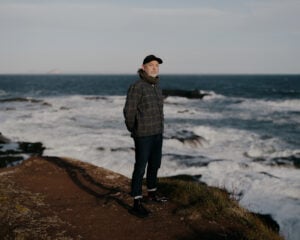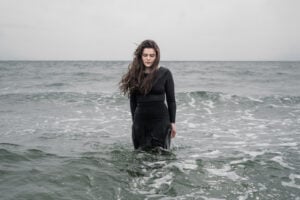Past event
Join the waiting list and be the first to find out if tickets become available.
| Matsukaze (Pining Wind): A Timeless Masterpiece by Zeami | |
|---|---|
| Interval | |
| Song of Rona Island (World Premiere): Scottish literature and music meet Japanese traditional theatre at the edge of the world |
| Kanji Shimizu (Kanze School) | Shite (main actor) |
|---|---|
| Takao Nishimura (Kanze School) | Jiutai (chorus) |
| Haruhiko Hasegawa (Kanze School) | Jiutai (chorus) |
| Satoshi Tsukitaku (Morita School) | Nohkan (flute) |
| Naoya Toriyama (Kanze School) | Kotsuzumi (small hand drum) |
| Mitsuhiro Kakihara (Takayasu School) | Ōtsuzumi (large hand drum) |
‘Song of Rona Island’, inspired by ‘On Rona’ by Kathleen Jamie, follows a traveller on an ecological survey to an abandoned island in the Outer Hebrides, and their encountering its haunting past. Six noh performers – led by Kanji Shimizu – join forces with fiddler Aidan O’Rourke and Scottish smallpipes player Brìghde Chaimbeul in a groundbreaking new work bringing together Scottish music and culture with Japanese noh theatre.
One autumn evening, a travelling monk reaches the shores of Suma (modern-day Kobe) and notices a pine tree said to mark the graves of two sisters, Matsukaze and Murasame, former saltmakers. The monk offers prayers for their souls. That night, two beautiful women return from drawing seawater under the moonlight and offer the monk to stay for one night. When the monk mentions the poet Ariwara no Yukihira, once exiled there, the women weep—revealing themselves as the sisters’ ghosts, who long ago loved Yukihira.
Overwhelmed with emotion, Matsukaze dons Yukihira’s cloak and cap. Mistaking the pine tree for her beloved, she clings to it and dances in a frenzy of remembrance, until dawn breaks . The sisters vanish like mist, leaving only the sound of wind in the pines.
Noh Reimagined 2025 (Barcelona and London) presents Matsukaze outside Japan for the first time since its staging in Paris in 1969.
Its enduring themes of memory, place, and nature resonate profoundly with those explored in Song of Rona Island being world premiered after the interval.
Please note that this performance has been adapted from the original, featuring the shite (main actor), jiutai (chorus), and ohayashi (musicians), to fit within a 45 minute performance.
Rona, a tiny island in the Outer Hebrides, was once home to a chapel founded by St Ronan in the 8th century, alongside a small farming community. The people of Rona were repeatedly devastated by famine and isolation until the island fell silent. Today, it is visited only by naturalists, sailors, and scientists who study its seabirds and seals. Kathleen Jamie’s essay ‘On Rona’ evokes both the island’s haunting past and its ecological present—between empty villages and declining seabird colonies, Rona displays an austere beauty marked by collapse.
Directed by Yanagisawa, in collaboration with artists and creative team , this story is reimagined through the dramaturgy of noh theatre, with St Ronan (played by a Noh shite actor) appearing in the dream of a contemporary Scottish traveller. Through dialogue, chant, and music, he recounts Rona’s histories of hardship and loss, while also invoking the island’s natural cycles, and its enduring spirit. As the traveller awakens, the memories of Rona Island linger, tinged with a longing to return. Originally conceived by Akiko Yanagisawa and Aidan O’Rourke for the Cultural Olympiad 2020 and further developed following a work-in-progress performance in Tokyo in 2024, the work receives its world premiere this evening.
Video by Kuniaki Izumi
This event (both performances combined) will last approximately 110 minutes, including an interval.
Kanji Shimizu (shite actor, Kanze School) is one of the most sought-after noh actors today. Born in 1953, he started noh training after graduating Wa Kanji Shimizu (shite actor, Kanze School) is one of the most sought-after noh actors today. Born in 1953, he started noh training after graduating Waseda University. In 2019, performances of Holly Mother in Nagasaki written by a renowned scientist Tomio Tada and Jacob’s Well written by a renowned Austrian art historian Diethard Leopold, were held in three cities across Europe. Shimizu actively engages in interdisciplinary collaborations, including productions with contemporary theatre and dance, as well as joint performances with other traditional performing arts such as Okinawa’s Kumi Odori and China’s Kunqu. In 2024, he was awarded the prestigious Kanze Hisao Award for his outstanding contributions to the development of noh theatre tradition. Shimizu is designated as an Important Intangible Cultural Property by the Japanese government.

Aidan O’Rourke is a fiddle player, composer, curator and teacher. He is a leading figure in contemporary folk music. Raised in an Irish family in Argyll, he learned fiddle in the West Highland style and is known for pushing the boundaries of Scottish and Irish traditions. He co-founded the trailblazing trio Lau in 2006, winners of four BBC Folk Awards.
Over four decades, he has played with groups including Blazin’ Fiddles, Atlantic Arc, and Kan, and collaborated with musicians like Kit Downes, Brìghde Chaimbeul, and Sean Shibe.
Aidan was named Musician of the Year at the 2014 BBC Folk Awards. His solo albums include Sirius, 365, and Iorram, the latter being the score for the first Gaelic feature documentary.
As a composer, he has written for major ensembles and festivals across the UK and beyond. His ambitious project 365—a tune written each day for a year—was widely acclaimed. In 2022, he curated A Great Disordered Heart for the Edinburgh International Festival, which included his film collaboration The Ballad of a Great Disordered Heart. In 2024, Aidan wrote Qullaq, the opening work for Nordic Music Days, Glasgow. It is scored for fiddle, Unuit musicians and Scottish Ensemble. That same year he was guest curator at Kings Place in London and as a composer received a Paul Hamlyn Award for Artists.

Brìghde Chaimbeul (Breech-huh Campbell) is a leading purveyor of celtic experimentalism and a master of the Scottish smallpipes; a bellows-blown, mellower cousin to the famous Highland bagpipes. A native Gaelic speaker, Brìghde roots her music in her language and culture. She rose to prominence as a prodigy of traditional music, but has since begun a journey to take the smallpipes into unchartered territory. She has devised a unique way or arranging for pipe music that emphasises the rich textural drones of the instrument; the constancy of sound that creates a trance-like atmosphere, played with enticing virtuosic liquidity. She draws inspiration from the world of interconnected piping traditions, but her most recent album brings in influence from ambient, avant garde and electronic music.
Her mesmerising musicianship has won her many awards and media recognition, including BBC Young Folk Award, BBC Horizon Award, SAY Award nomination and a wide array of collaborators include Caroline Polachek, Colin Stetson, Gruff Rhys, Radie Peat.
Brìghde’s smallpipes are made by renowned makers Fin Moore and Hamish Moore.
Gareth is a writer, director, dramaturg, and translator, originally from the Wirral. A graduate of Cambridge University, Guildhall School of Music and Drama, and New York University’s Tisch School of the Arts, their work explores the cross cultural and queer potential of contemporary music theatre.
Recent and upcoming work includes ;crypt_ (Munich Biennale, as librettist), Theo in Between (Carriageworks Theatre, BYMT, as bookwriter and lyricist), Who is Molly Leigh? (B Arts, as writer and co-director), You Should (Should!) Be Dancing! (REMIX Ensemble, Casa da Música in Porto, Portugal, as librettist – work awarded 2025 ISCM Young Composer Award), Beauty and the Beast (Jermyn Street Theatre, Foreign Affairs Theatre Translator Mentorship, as translator), A Tale of the Sumida River / Sumidagawa (Aldeburgh Festival, Noh Reimagined Festival, as co-writer and many others.
Kings Place Concessions Tickets
We want to ensure that people who may be struggling financially to purchase a ticket can still enjoy visiting Kings Place. A limited number of tickets are allocated for certain events (if the ticket type does not show in the booking pathway, it means they are not available for this event or have all been sold). Concessions tickets are accessible for people on the following criteria (for more information visit our FAQs)
£10 ‘Under 30s’ tickets
A limited number of £10 tickets for attendees aged under 30 are available for certain shows. To purchase an ‘Under 30s’ ticket, please choose the ‘Under 30s’ price type when selecting your ticket(s). If the option does not appear, this means all ‘Under 30s’ tickets have sold out or are not available for this performance. Please note that proof of age may be requested at the venue. The £10 offer does not apply to premium price categories.
Getting here
Kings Place is situated just a few minutes’ walk from King’s Cross and St Pancras stations, one of the most connected locations in London and now the biggest transport hub in Europe.
Our address is:
90 York Way, London, N1 9AG.
The Venue
Our performance spaces are situated on the lower ground floor. Hall One, Hall Two and St Pancras are located in level -2, reached by stairs, escalator and lift from the ground floor entrance level.
Event Times
Door times indicate auditorium entrance times only. Visitors are welcome to enjoy the Kings Place seating areas, gallery-level art, canal-side terrace, café, restaurant and bar throughout the day and evening.
We aim to make your visit to Kings Place as comfortable as possible. For more information about the accessibility of Kings Place, including details about our Access Scheme, please visit this page.
If you would like to discuss your access requirements with a member of our team, please get in touch with the Box Office team at info@kingsplace.co.uk.
Rotunda Bar & Restaurant
Rotunda, situated on the ground floor of Kings Place, offers a unique dining and drinking experience alongside Regent’s Canal. The concert bar in the venue foyer will also be open for select events.
Green & Fortune Café
Recently re-furbished and now open with a new look, the Green & Fortune Café is open for selected concerts. Serving hot and cold food and drinks, including sandwiches, salads, soup, stew and a pie of the day, alongside a choice of cakes made by the on-site bakery team. See here for selected concert dates and standard opening hours.

